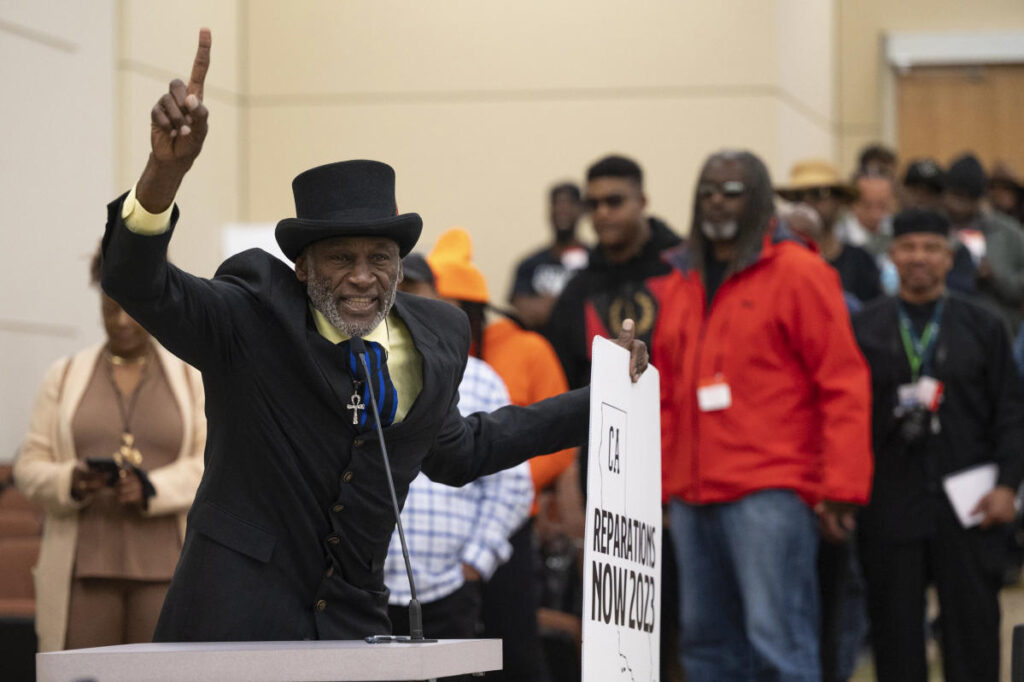SACRAMENTO, Calif. (AP) — California’s first-in-the-nation slavery reparations task force wraps up its historic work Thursday with the official submission of a report two years in the making, one that documents the state’s role in perpetuating discrimination against Black residents and suggests dozens of ways to atone.
The report heads to lawmakers who will be responsible for turning policy recommendations into legislation. Reparations will not happen until lawmakers and Gov. Gavin Newsom agree.
The recommendations include a formal apology to descendants of people enslaved in the U.S. and financial compensation for harms descendants have suffered, such as overpolicing and housing discrimination. The panel also recommended the state create a new agency to oversee reparations efforts.
“It’s been a whirlwind, it’s been very work intensive, but also very cathartic and very emotional,” said Kamilah Moore, 31, task force chair and a Los Angeles-based attorney. “We’re standing in the shoes of our ancestors to finish, essentially, this sacred project.”
The nine-member panel convened in June 2021 after Gov. Gavin Newsom signed legislation in 2020 creating the task force. The panelists, picked by Newsom and leaders of the Senate and Assembly, include the descendants of slaves who are lawyers, educators, elected officials and civil rights leaders.
Reparations efforts at the federal level have stalled for decades, but cities, counties, school districts and universities have taken up the cause in recent years. An advisory group in San Francisco has recommended that qualifying Black adults receive a $5 million lump-sum payment, guaranteed annual income of at least $97,000 and personal debt forgiveness. San Francisco supervisors will take up the issue later this year.
New York could become the second state to create a commission to examine state involvement in the institution of slavery, and to address present-day gaps in economical and educational disparities experienced by Black people. The legislation, approved earlier this month by lawmakers, has not yet been signed by Gov. Kathy Hochul.
California entered the union as a free state in 1850, but in practice sanctioned slavery and approved policies and practices that thwarted Black people from owning homes and starting businesses. Black families were terrorized, their communities aggressively policed and their neighborhoods subject to environmental pollutants, according to a groundbreaking report released last year as part of the committee’s task to educate the public.
The panel did not recommend a fixed dollar amount for financial redress, but endorsed methodologies by economists for calculating what is owed for decades of overpolicing, disproportionate incarceration and housing discrimination. Initial calculations pegged the potential cost to California at more than $800 billion — more than 2.5 times the state’s $300 billion annual budget — although that cost was reduced to $500 billion in a later report without explanation.
“Overall, what we said is we believe there should be compensation, elders should be prioritized and it should be in installments,” Moore said.
For those elders, economists recommended, for example, nearly $1 million for a 71-year-old Black person who has lived all their life in California — or $13,600 per year — for health disparities that have shortened their average life span.
Black people subjected to aggressive policing and prosecution in the “war on drugs” from 1971 to 2020 could each receive $115,000 if they lived in California throughout that period or more than $2,300 for each year they lived in the state during that period.
The task force narrowly voted to limit individual financial redress to residents who can document lineage from Black people who were in the U.S. in the 19th century, thereby excluding more recent immigrants.
[ad_2]
Source link

